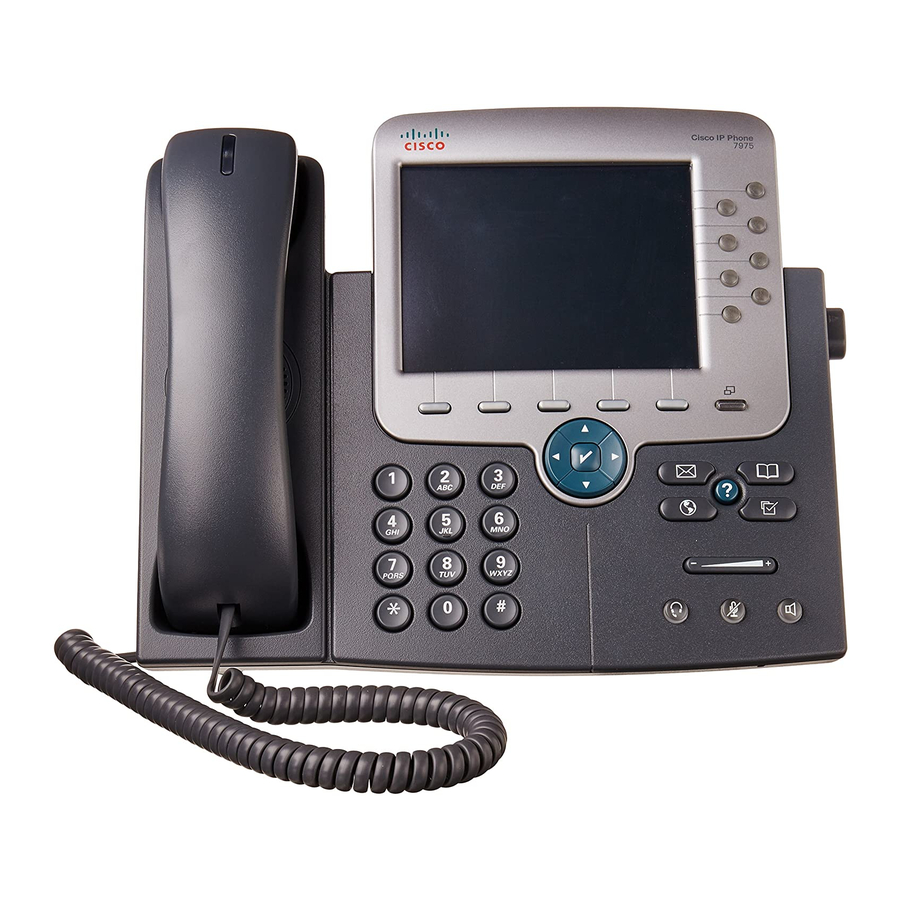- ページ 24
IP電話 Cisco 7970G - IP Phone VoIPのPDF トラブルシューティングとメンテナンスをオンラインで閲覧またはダウンロードできます。Cisco 7970G - IP Phone VoIP 25 ページ。 Unified ip phones
Cisco 7970G - IP Phone VoIP にも: ユーザーマニュアル (21 ページ), インストールの準備 (17 ページ), インストレーション・マニュアル (19 ページ)

Cisco Unified IP Phone Cleaning
Table 5: Changes to Voice Quality Metrics
Metric change
MOS LQK scores decrease significantly
MOS LQK scores decrease significantly
Conceal Ratio and Conceal Seconds increase
significantly
Conceal Ratio is near or at zero, but the voice quality
is poor.
Note
Voice quality metrics do not account for noise or distortion, only frame loss.
Cisco Unified IP Phone Cleaning
To clean your Cisco Unified IP phone, use a soft, dry cloth to wipe the phone screen. Do not apply liquids or
powders directly on the phone. As with all non-weather-proof electronics, liquids and powders can damage
the components and cause failures.
Disable the screen before cleaning it so that you will not inadvertently choose a feature from the pressure of
the cleaning cloth. To disable the screen, press Display for more than one second. The phone displays
Touchscreen Disabled or Phone Screen Disabled and the Display button flashes green.
After one minute, the screen automatically reenables itself. To reenable the screen before that, press the
flashing Display button for more than one second. The phone displays Touchscreen Enabled or Phone
Screen Enabled.
Troubleshooting and Maintenance
24
Troubleshooting and Maintenance
Condition
Network impairment from packet loss or high jitter:
• Average MOS LQK decreases could indicate
widespread and uniform impairment.
• Individual MOS LQK decreases indicate bursty
impairment.
Cross-check with Conceal Ratio and Conceal Seconds
for evidence of packet loss and jitter.
Check to see whether the phone is using a different
codec than expected (RxType and TxType).
Check to see whether the MOS LQK version changed
after a firmware upgrade.
• Network impairment from packet loss or high
jitter.
Noise or distortion in the audio channel such as echo
or audio levels.
Tandem calls that undergo multiple encode/decode,
such as calls to a cellular network or calling card
network.
Acoustic problems coming from a speakerphone,
handsfree cellular phone, or wireless headset.
Check packet transmit (TxCnt) and packet receive
(RxCnt) counters to verify that voice packets are
flowing.
